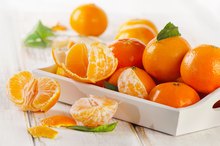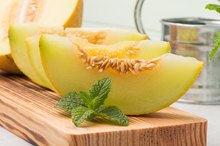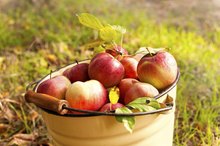How Do Guavas Affect Blood Sugar?
Guava is native to tropical climates, and crops are successfully grown in California and Florida. The sweet fruit comes into its peak season during the fall and winter months with the final stretch of guava season at the start of the new year. The USDA recommends having 2 cups of fruits per day. If you are trying to regulate your blood sugar, knowing guava's carbohydrate content and glucose effect can be helpful.
Carbohydrates and Protein
Guava contains 13 g of total carbohydrates per fruit of which 8 g is sugar. The remaining 5 g is from fiber. Along with the carbohydrates, guava contains 2 g of protein per fruit.
Carbohydrates
Does Fruit Make Your Blood Sugar Go Up?
Learn More
Carbohydrates break down into glucose, which your body's cells use for energy. The glucose is delivered to your cells through your bloodstream. When you eat something that contains carbohydrates your blood glucose level increases as the carbohydrates are converted to glucose. The sugar content metabolizes quickly, reaching your bloodstream rapidly.
- Carbohydrates break down into glucose, which your body's cells use for energy.
- When you eat something that contains carbohydrates your blood glucose level increases as the carbohydrates are converted to glucose.
Dietary Fiber
The fiber content in guava reduces the digestion of carbohydrates. Fiber is not digested by the body but passes through without affecting your blood glucose. When you want to determine the actual carbohydrate effect of a food, reduce the grams of carbohydrates per serving by half of the dietary fiber grams if there are 5 grams or more per serving. The net carbohydrate count indicates the overall glucose reaction your body may experience. For example, guava contains 13 g of carbohydrates per serving. Subtract half of the 5 grams of dietary fiber, because the fiber content has no glucose effect. The net carbohydrates for a guava serving is10 g.
- The fiber content in guava reduces the digestion of carbohydrates.
- When you want to determine the actual carbohydrate effect of a food, reduce the grams of carbohydrates per serving by half of the dietary fiber grams if there are 5 grams or more per serving.
Protein
The Glycemic Index for Tangerines
Learn More
Adding 5 g or more of protein to a carbohydrate serving can slow your body's digestion, creating a gradual blood glucose reaction that helps reduce the occurrence of blood sugar highs. Add a lean protein serving such as soft cheese or salmon when you eat fresh fruits that contain natural sugar such as guava to reduce the overall carbohydrate effect.
Related Articles
References
- Fruits and Veggies More Matters: Guava
- Guavas, common, raw. FoodData Central. U.S. Department of Agriculture. Published April 1, 2019.
- Chen Y-Y, Wu P-C, Weng S-F, Liu J-F. Glycemia and peak incremental indices of six popular fruits in Taiwan: Healthy and type 2 diabetes subjects compared. J Clin Biochem Nutrition. 2011;49(3):195–199. doi:10.3164/jcbn.11-11
- Antioxidants: In Depth. National Center for Complementary and Integrative Health. Updated September 24, 2017
- Pullar JM, Carr AC, Vissers MCM. The roles of vitamin C in skin health. Nutrients. 2017;9(8):866. doi:10.3390/nu9080866
- Kumari S, Rakavi R, Mangaraj M. Effect of guava in blood glucose and lipid profile in healthy human subjects: A randomized controlled study. J Clin Diagn Res. 2016;10(9):BC04-BC07. doi:10.7860/JCDR/2016/21291.8425
- Aune D, Giovannucci E, Boffetta P, et al. Fruit and vegetable intake and the risk of cardiovascular disease, total cancer and all-cause mortality-a systematic review and dose-response meta-analysis of prospective studies. Int J Epidemiol. 2017;46(3):1029–1056. doi:10.1093/ije/dyw319
- König A, Schwarzinger B, Stadlbauer V, et al. Guava (Psidium guajava) fruit extract prepared by supercritical CO2 extraction inhibits intestinal glucose resorption in a double-blind, randomized clinical study. Nutrients. 2019;11(7):1512. Published 2019 Jul 3. doi:10.3390/nu11071512
- Li Y, Zhang JJ, Xu DP, et al. Bioactivities and health benefits of wild fruits. Int J Mol Sci. 2016;17(8):1258. doi:10.3390/ijms17081258
Writer Bio
Tara Kimball is a former accounting professional with more than 10 years of experience in corporate finance and small business accounting. She has also worked in desktop support and network management. Her articles have appeared in various online publications.









